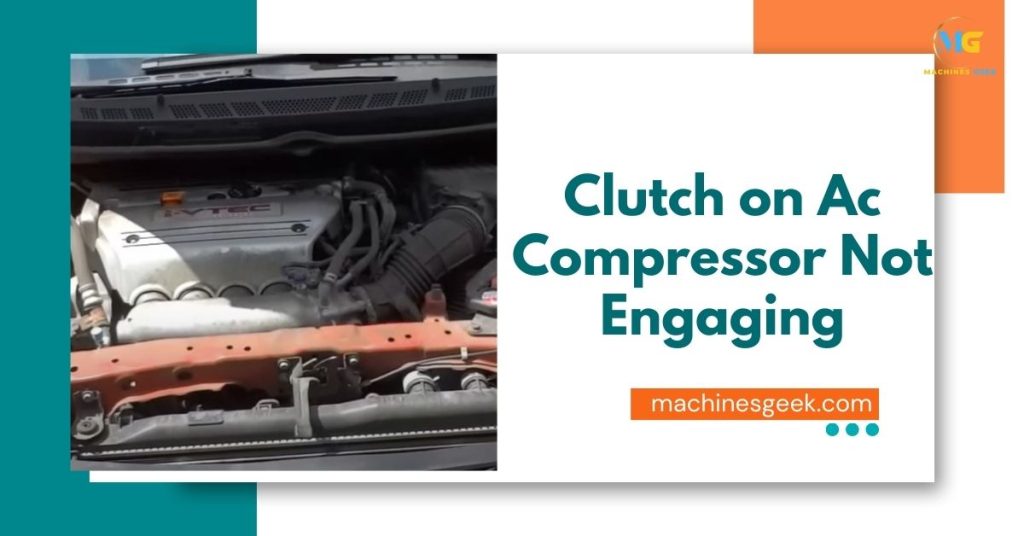The AC compressor may not be engaging due to a faulty clutch or low refrigerant levels. We will explore the common reasons for an AC compressor not engaging and provide possible solutions to resolve the issue.
We will also discuss the importance of regular AC maintenance to prevent compressor failure and ensure optimal performance. So, if you’ve noticed that your AC is not cooling or the compressor is not engaging, keep reading to find out how to troubleshoot and fix the problem.
Now, let’s dive into the details and get your AC system back up and running!
Common Symptoms Of A Faulty Ac Compressor
One of the common symptoms of a faulty AC compressor is a lack of cold air in the cabin. If the clutch on the AC compressor is not engaging, it will prevent the compressor from properly cooling the air. This can result in the AC system not cooling the cabin as effectively as it should.
Another common symptom of a faulty AC compressor is unusual noises coming from the compressor. If you hear grinding, rattling, or other strange noises when the AC is turned on, it could indicate a problem with the compressor.
Additionally, an AC system that is not cooling properly can also be a sign of a faulty compressor. If the air blowing from the vents is only slightly cool or not cold at all, it may be due to a compressor issue.
Possible Causes Of Ac Compressor Not Engaging
There are several possible causes for a clutch on an AC compressor not engaging. One possible cause is low refrigerant levels. When the refrigerant levels are low, the system may not have enough pressure to engage the clutch and activate the compressor. In this case, adding refrigerant to the system may resolve the issue.
Another potential cause is a faulty clutch coil. The clutch coil is responsible for engaging the clutch and starting the compressor. If the coil is damaged or not functioning properly, the clutch may not engage. Replacing the clutch coil may be necessary to fix the problem.
Additionally, a blown fuse or relay can prevent the AC compressor from engaging. If the fuse or relay that controls the compressor is blown, it will need to be replaced. Finally, a malfunctioning pressure switch can also cause the AC compressor not to engage. The pressure switch monitors the system’s pressure and signals the compressor to turn on. If the switch is faulty, it may not send the correct signal to activate the compressor.
Step 1: Checking Refrigerant Levels
Checking the refrigerant levels is an important step in diagnosing the clutch on AC compressor not engaging issue. Pressure gauges are a valuable tool for this task. By connecting the gauges to the system, you can measure the refrigerant levels.
High levels could indicate an overcharging problem, which can strain the compressor and prevent the clutch from engaging. Low levels, on the other hand, could point to a leak or insufficient refrigerant in the system. In either case, it’s crucial to address the root cause and adjust the levels accordingly.
Step 2: Inspecting The Clutch Coil
Inspecting the clutch coil is an important step in diagnosing the issue of the AC compressor not engaging. The clutch coil is responsible for engaging and disengaging the compressor, allowing it to function properly. To understand the function of the clutch coil, it’s essential to know that it creates a magnetic field that pulls the clutch plate toward the compressor, engaging it.
When inspecting the clutch coil, look for signs of damage or wear. A damaged or worn clutch coil can prevent the compressor from engaging. Check for any frayed wires, loose connections, or visible signs of burning or overheating. If any damage is found, it’s crucial to replace the faulty clutch coil.
Step 3: Testing Fuses And Relays
When troubleshooting a clutch on AC compressor not engaging, it’s important to check the fuses and relays to ensure they are functioning properly. To do this, you need to locate the fuse and relay box in your vehicle. This box is typically found under the hood or in the engine compartment.
Once you’ve located the fuse and relay box, check for any blown fuses. Blown fuses can prevent the compressor clutch from engaging. If you find any blown fuses, replace them with ones of the same amperage rating.
In addition to checking the fuses, it’s also crucial to inspect the relays. Relays can fail or become faulty over time, leading to issues with the compressor clutch. Remove the relays one by one and visually inspect them for any signs of damage or burning. If you notice any issues, replace the faulty relay.
By testing the fuses and relays, you can eliminate them as potential causes for the AC compressor clutch not engaging. This will help you narrow down the issue and proceed with further troubleshooting steps.
Step 4: Dealing With A Faulty Pressure Switch
In order to diagnose the issue of the Clutch on AC Compressor Not Engaging, it is important to understand the role of the pressure switch. The pressure switch plays a crucial role in regulating the operation of the AC system by monitoring the pressure levels in the system. Testing the pressure switch for functionality is a crucial step in troubleshooting the problem.
To test the pressure switch, you can use a multimeter to check for continuity. Start by disconnecting the electrical connector from the pressure switch and then check for continuity between the terminals using the multimeter. If there is no continuity, it indicates a faulty pressure switch that needs to be replaced.
If the pressure switch is found to be faulty, it is important to replace it with a new one. Begin by removing the old pressure switch by unscrewing it from its location. Ensure that the new pressure switch is compatible with your AC system and then install it by screwing it into place.
By understanding the role of the pressure switch and performing the necessary testing and replacement, you can effectively deal with a faulty pressure switch and resolve the issue of the Clutch on AC Compressor Not Engaging.
Signs That Professional Help Is Needed
The clutch on the AC compressor not engaging is a common issue faced by many car owners. While some problems can be resolved easily, there are certain signs that indicate the need for professional help, particularly when it comes to complex electrical issues. Lack of experience or knowledge in AC systems can further complicate the troubleshooting process. It is important to recognize when it is time to seek expert assistance.
Professional help is needed in situations where the problem lies beyond basic troubleshooting. Complex electrical issues can arise due to various reasons such as faulty wiring, malfunctioning sensors, or issues with the compressor itself. These problems require specialized knowledge and tools to diagnose and repair.
Attempting to fix such electrical issues without proper expertise can result in further damage to the system and may lead to costly repairs or replacement. Therefore, it is advisable to consult a certified technician who can accurately identify the underlying cause and undertake the necessary repairs or replacements.
Finding An Expert Ac Technician
Referrals from friends or family can be a valuable resource when searching for an AC technician. Ask around to see if anyone has had a positive experience with a particular technician or company.
Another option is to check online reviews and ratings for local HVAC companies. This can give you an idea of the level of satisfaction previous customers have had with their services.
To ensure you are choosing a reputable technician, it is also a good idea to contact local HVAC companies directly. Inquire about their experience, certifications, and warranties offered.
By following these steps, you can find an expert AC technician who can diagnose and fix the issue of your clutch on AC compressor not engaging.
Cost Of Ac Compressor Repair Or Replacement
When your clutch on the AC compressor is not engaging, it may indicate a repair or replacement is necessary. The cost of AC compressor repair or replacement can vary depending on several factors. Firstly, the make and model of your vehicle and the type of AC compressor used will influence the overall cost.
Additionally, the extent of damage to the compressor and the availability of replacement parts can affect the price. Labor charges also play a significant role in determining the cost. It is recommended to obtain multiple quotes from reputable repair shops to make a comparison.
This ensures that you get the best price without compromising on the quality of the repairs. By considering these factors and obtaining multiple quotes, you can find an affordable solution for your AC compressor issue.
Is a Faulty Clutch on the AC Compressor Causing My Car’s Air Conditioner to Only Work on High?
Yes, a faulty clutch on the AC compressor can definitely cause car air conditioner issues, such as only working on high. The clutch is responsible for engaging and disengaging the compressor, so if it malfunctions, it can lead to uneven cooling or complete failure.
Frequently Asked Questions
Why Is The Clutch On My Ac Compressor Not Engaging?
The clutch on your AC compressor may not be engaging due to a faulty clutch coil, low refrigerant levels, or a malfunctioning pressure switch.
How Can I Fix The Clutch On My Ac Compressor Not Engaging?
To fix the clutch on your AC compressor, you can check the clutch coil for continuity, recharge the refrigerant levels, or replace the pressure switch if it is faulty.
What Are The Signs Of A Clutch On Ac Compressor Not Engaging?
Signs of a clutch on AC compressor not engaging include warm air blowing from the vents, strange noises coming from the compressor, and the AC not cooling the interior of your vehicle.
Conclusion
To summarize, if you have noticed that the clutch on your AC compressor is not engaging, it is crucial to address the issue promptly. Ignoring this problem can result in a lack of cool air and further damage to your AC system.
By troubleshooting the common causes, such as low refrigerant levels or a faulty clutch, you can potentially save yourself the cost and inconvenience of a major repair. Don’t hesitate to seek professional assistance if needed, ensuring the optimal functioning of your AC unit.








